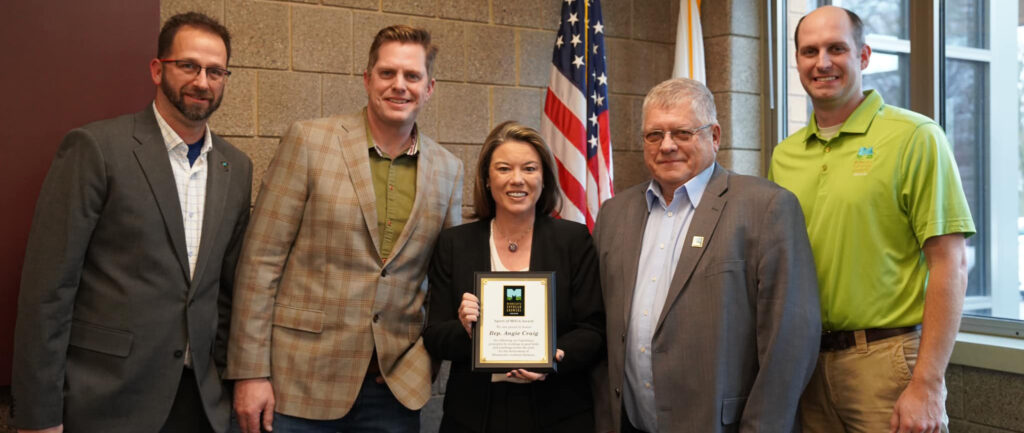The first phase of construction on the Ag Innovation Campus schedule is completed, as the non-profit crush and research facility moves a step closer to its 2022 production goal.
“We’re excited to be on track and moving forward with our plan to launch next year,” AIC Board Chair Mike Skaug said. “Despite all the sizable obstacles the pandemic and supply chain issues have thrown at us, we are proud that we’ve stayed the course and are continuing to advance the Ag Innovation Campus in the right direction.”
Overseen by U.S. SiteWork, dirt started moving on the 10-acre site in late summer 2021. The first phase of construction consisted of utility work, including sewer and water installation. During the two-month construction process, the city of Crookston also approved funding for a web camera to document the progress.
“The city is proud to be a partner in this project that is such an asset to our community,” Crookston City Administrator Amy Finch said. “Many people have committed their time and efforts to make this a reality, and it is a great investment in Crookston.”
The cutting-edge Campus will host a specialty crushing facility, allowing entrepreneurs from universities and private business, private seed developers and processing companies access to affordable processing, designed to lower costs while promoting growth of value-added products. The Campus is available to private industries to create products that benefit all parties, from farm gate to consumers. Education will also be a key component to the AIC, featuring state-of-the-art classrooms; a conference room that can host up to 100 people; laboratories; a training site to develop the next generation of processing professionals; and to allow customers around the world a direct connection to premium U.S. agricultural products.

A fully operational AIC will boost the regional ag economy, create job opportunities across the region and crush more than 60,000 tons per year of soybeans.
‘A key component’
The AIC will support three crushing lines, each of which can be operated independently on either organic, non-GMO or GM soybeans, as well as separately for the end products. The AIC anticipates that, in the near future, it will also work on other oil seeds, including cover crops. Profits from the facility will be granted to projects designed to advance agriculture, making the Ag Innovation Campus a major source of new ideas.
“This facility really has the potential to revitalize the ag economy through Minnesota and the region,” AIC board member Trevore Brekken said. “As a farmer in this region, the Ag Innovation Campus will be a huge deal for producers.”
During Minnesota’s 2021 Legislative Session, following advocacy efforts from the Minnesota Soybean Growers Association, lawmakers approved a provision that lifts a weight restriction on trucks hauling soymeal west of Highway 2 and Highway 75 north of Crookston to the Canadian border, a major regional soybean market. During the first building phase, Minnesota Department of Agriculture Commissioner Thom Petersen visited with farmer-leaders at the AIC site. The commissioner said the facility is primed to further develop value-added processing and bring products to commercialization.
“It’s great to see phase one of the AG Innovation Campus construction completed and to know that Minnesota’s soybean and specialty crop growers, and oilseed companies are moving closer to commercialization of their products,” Petersen said. “The AIC is a key component needed for innovators, farmers and processors to compete in the value-added global supply chain.”
In the months ahead, the AIC team will be seeking in-kind donors and private and public partners; finalizing assessment of equipment needs; and determining engineering designs. The next phase of construction is set to begin in 2022.
“We’re looking forward to 2022, and we’re encouraged by how far we’ve already come, thanks to support from farmer-leaders, the city of Crookston, elected officials and our strategic partners,” acting AIC CEO Tom Slunecka said. “Agriculture has always pulled itself up by its boot straps, and the AIC is the next evolution in how agriculture is looking out for not only our future, but the future of everyone who demands safe and abundant food, clean air and clean water.”
To learn more about the Ag Innovation Campus vision, visit aginnovationcampus.org.






